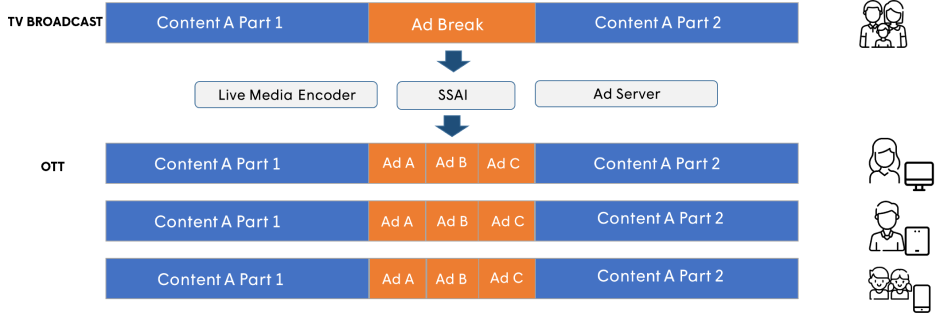
Enable ADS Insertion Everywhere
Dynamic Ad Insertion – also known as Server-side ad insertion (SSAI) – enables the seamless delivery of video ads into content streamed on internet-enabled devices.
- Seamless ads. Personalized streams. Monetize effortlessly
- Unlock ad potential. Scale seamlessly.
What's included
Dynamic Ad-Insertion
Replace broadcasst ad-breaks with addressable OTT Ads Insert ads into Live- Linear TV and VoD streams.
Precise Ad Targeting
Target to User-Segments to personalize streams One to One Connect wwith Supply Side Platforrms and Ad-Servers.
Scale for Large Audiences
Cloud solution and Easy to scale Handling large volumes of concurrent viewers.
Consistent User Experience
Support MPEG DASH and HLS for VOD, Linear Channels. Individualized streaming to all IP device.
Analytics Tool
Tracks Content Popularrity, Viewer Engagement, Ad perforrmance Service Monitorring 24/7.
Integration
Can use all with Sigma Stream Platform Synchronized ecosystem.
Avoiding Ad Blockers for Video Monetization
By integrating content and ads into one continuous stream, SSAI provides a seamless viewing experience, similar to a traditional advertising break. We offers SSAI technology that makes it possible to exchange and insert TV spots on the fly, so broadcasters can increase yield from linear streams within OTT and web environments.

By integrating content and ads into one continuous stream, SSAI provides a seamless viewing experience, similar to a traditional advertising break. We offers SSAI technology that makes it possible to exchange and insert TV spots on the fly, so broadcasters can increase yield from linear streams within OTT and web environments.

Users stream video or OTT content on internet-enabled devices via content delivery networks (CDNs). When a user reaches an ad break, the SSAI server requests ads from third-party ad servers. The SSAI server then stitches those ads – at the same bitrate, frame rate and audio level as the underlying stream – directly into the content, which is passed back to the viewing device via the CDN.
